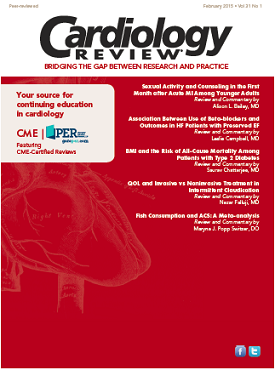Publication
Article
CME Test - February 2015
Click here to review the CME questions for this month's issue.
CME Questions for Cardiology Review - February 2015
Acute Coronary Syndrome
1. Consumption of fish has been shown to have the following cardiovascular effect:
a. Consumption of both fish and omega-3 fatty acids is equally beneficial in primary prevention of acute coronary syndrome.
b. Fish consumption is beneficial in primary prevention of acute coronary syndrome; however, a dose- dependent relationship does not exist.
c. Fish consumption is beneficial in primary prevention of acute coronary syndrome, with a dose-dependent relationship.
d. Fish consumption is not beneficial in primary prevention of acute coronary syndrome.
Heart Failure
2. What percentage of heart failure is attributed to heart failure with preserved ejection fraction?
a. 15%
b. 25%
c. 50%
d. 80%
Diabetes
3. Obesity is a risk factor for which of the following?
a. Diabetes, hypertension, and high cholesterol.
b. Stroke and heart disease.
c. Certain cancers and arthritis.
d. All of the above
Interventional Cardiology
4. In the Invasive Revascularization or Not in Intermittent Claudication (IRONIC) trial, all patients were placed on medical therapy, which entailed:
a. Cilostazol, a statin, and dual antiplatelet therapy with aspirin and clopidogrel
b. Pentoxyphyline, a statin, aspirin and clopidogrel.
c. Cilostazol, a statin, aspirin or clopidogrel
d. Pentoxyphyline, a statin, aspirin or clopidogrel
Myocardial Infarction
5. After an acute myocardial infarction (AMI), current guidelines would support which of the following approaches to patient sexual activity counseling?
a. Wait for the patient to approach the healthcare provider to address sexual activity and restrictions.
b. Restrict sexual activity until a symptom-limited stress test is performed 4 to 6 weeks after uncomplicated AMI.
c. Discussion of sexual activity in every patient after AMI and restrictions for more than 1 week placed only in symptomatic patients.
d. Recommendation for restrictions on sexual activity to keep maximal heart rate below 80% of the age-predicted value.






